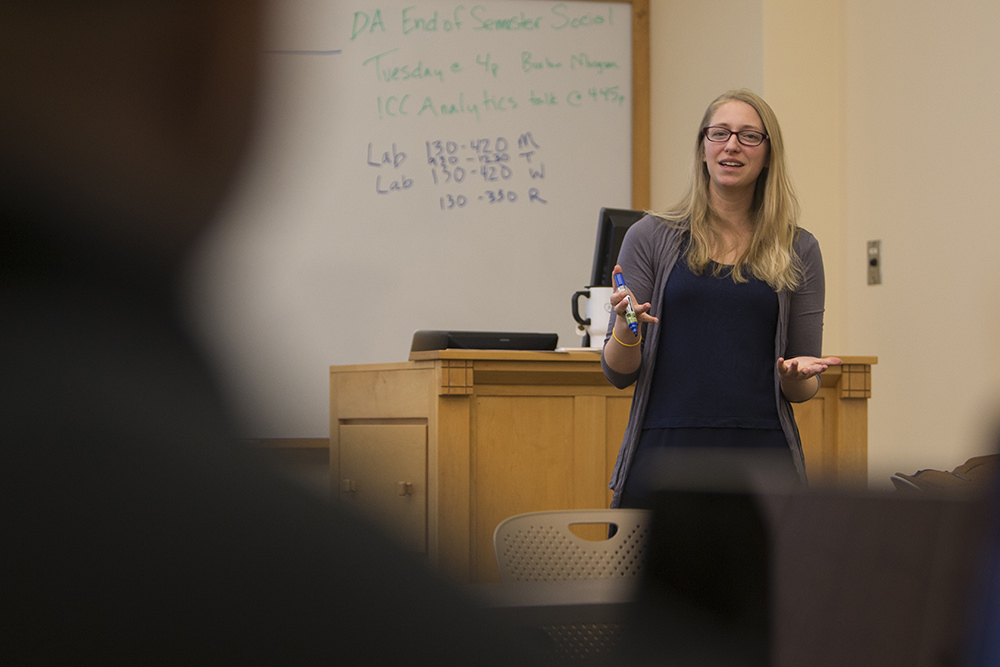For Jason Craig '19, taking Data Analytics 101 was an eye-opener. An economics major who also is concentrating in neuroscience, Craig took the class after realizing he needed to add some data analytics skills to his résumé.
“I missed out on an internship last summer because I didn't have this knowledge set,” said Craig, who found a different internship working on legal and financial risk analysis. “Now that I've taken this course, I'm thinking about all the things I can analyze using this information.”
“Data Analytics is becoming foundational at this point - as foundational as mathematics or writing,” said Sarah Supp, assistant professor of data analytics. “For so many career paths, being able to 'speak code' is a fundamental or required skill.”
Supp herself is an example of this emerging movement. Trained as an ecologist as an undergrad, when Supp went to graduate school, it became clear that to do the work she was drawn to, she needed computer science and statistics, the underpinning of much of data analytics. “As I got more into the field, I realized how rich it was, and ended up loving it.”
In Supp's DA 101 class, students learn about data sets and coding, but some of the most important course objectives might be surprising to the uninitiated.
“I emphasize teamwork strategies, a growth mindset and being comfortable with uncertainty,” said Supp. “You don't need to have any previous experience in computer programming. I'm battling the preconceived idea of 'the brilliant solo programmer.' It just doesn't work that way in real life. As a data analyst, you work with people and data to answer questions and solve problems - there's always a learning curve. It doesn't matter how smart you are, you will have some struggle to find answers to these puzzles. I find that exciting.”
Assignments are about coding correctly, but also about writing interpretations of questions and results that others can grasp. “Your boss may not know or understand what you're doing, but they need to understand the results. That's one reason why the ability to communicate well is so important in this field,” said Supp.
“I thought I would get some basic skills in excel and help in my Bloomberg Terminal applications,” said Craig. “I got that, but so much more. I have a lot of new skills, and I also have a new viewpoint. I look at the world through a data analytics lens.”
“I have a lot of new skills, and I also have a new viewpoint. I look at the world through a data analytics lens.”
The course introduced data-driven puzzles through a wide array of fields, including political, economic, historical, social and biological. For their final projects, students chose a data set from a previous project or found one online to analyze.
Craig and his partner discovered that Airbnb makes their data available online. That became the impetus for their project, to study variables that affect price and location of Airbnb rentals in the Boston area, near Craig's hometown.
To begin, they needed to find data that was 'clean;' data that is consistent and free of errors. Next, they determined if there were ethical concerns in analyzing the data. Data ethics concern privacy and security, among other issues. Since the data was freely and publicly available online, they deemed it to be ethically sound to use.
After thinking about the data and the Boston area, Craig and his partner hit upon the idea of plotting national landmarks and correlating them with the location and price of the rentals.
They created three statistical models and analyses.
“We came to several conclusions from our data,” said Craig. “One of our major questions was what affects price. We found that as distance from the closest landmark increases by one mile, price decreases by about $30.”
They also concluded that if you are trying to price your own Airbnb rental, you should consider the number of people you can accommodate, landmark distance, and the mean distance from other Airbnbs.
“Finally, we found that there was a high correlation between landmark distance and mean distance from Airbnbs,” said Craig. “It was fascinating to see just how close Airbnbs tend to be to landmarks.”
Craig wants to work in finance after graduation. And he offers some free advice. “Our research shows that new hosts should try to identify up and coming landmarks so you can charge a higher price later on. For renters, if you're willing to travel outwards from a central location, the price of your Airbnb will drop significantly.”
